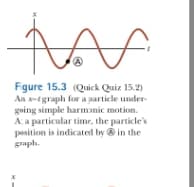Consider a graphical representation (fig 15.3) of simple harmonic motion as described mathematically in equation 15.6. When the particle is at point A on the graph, what can you say about its position and velocity? a. The position and velocity are both positive. b. The position and velocity both are negative. c. The position is positive and the velocity is zero. d. The position is negative, and the velocity is zero. e. The position is positive, and the velocity is negative. f. The position is negative, and the velocity is positive.
Simple harmonic motion
Simple harmonic motion is a type of periodic motion in which an object undergoes oscillatory motion. The restoring force exerted by the object exhibiting SHM is proportional to the displacement from the equilibrium position. The force is directed towards the mean position. We see many examples of SHM around us, common ones are the motion of a pendulum, spring and vibration of strings in musical instruments, and so on.
Simple Pendulum
A simple pendulum comprises a heavy mass (called bob) attached to one end of the weightless and flexible string.
Oscillation
In Physics, oscillation means a repetitive motion that happens in a variation with respect to time. There is usually a central value, where the object would be at rest. Additionally, there are two or more positions between which the repetitive motion takes place. In mathematics, oscillations can also be described as vibrations. The most common examples of oscillation that is seen in daily lives include the alternating current (AC) or the motion of a moving pendulum.


Trending now
This is a popular solution!
Step by step
Solved in 2 steps









